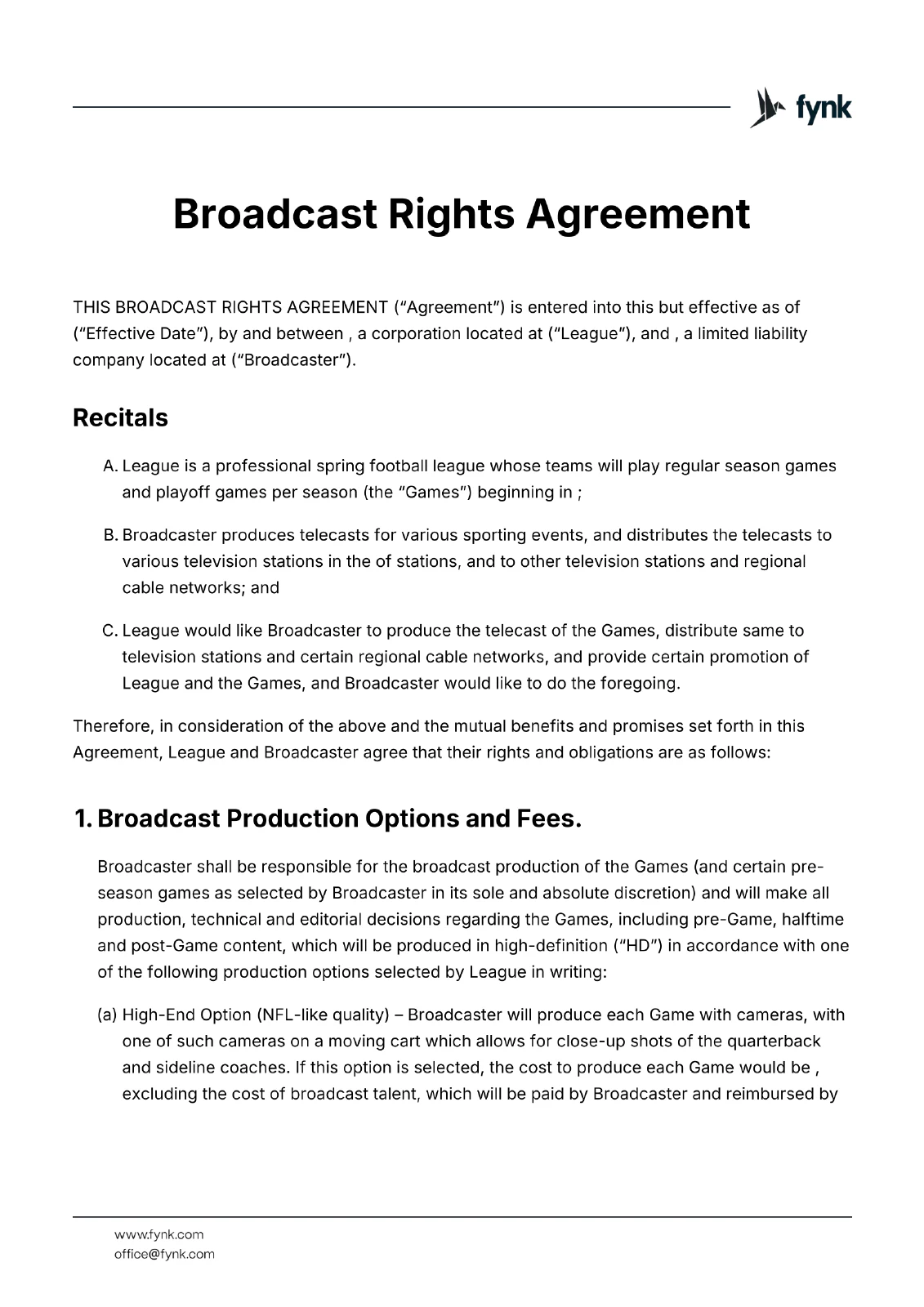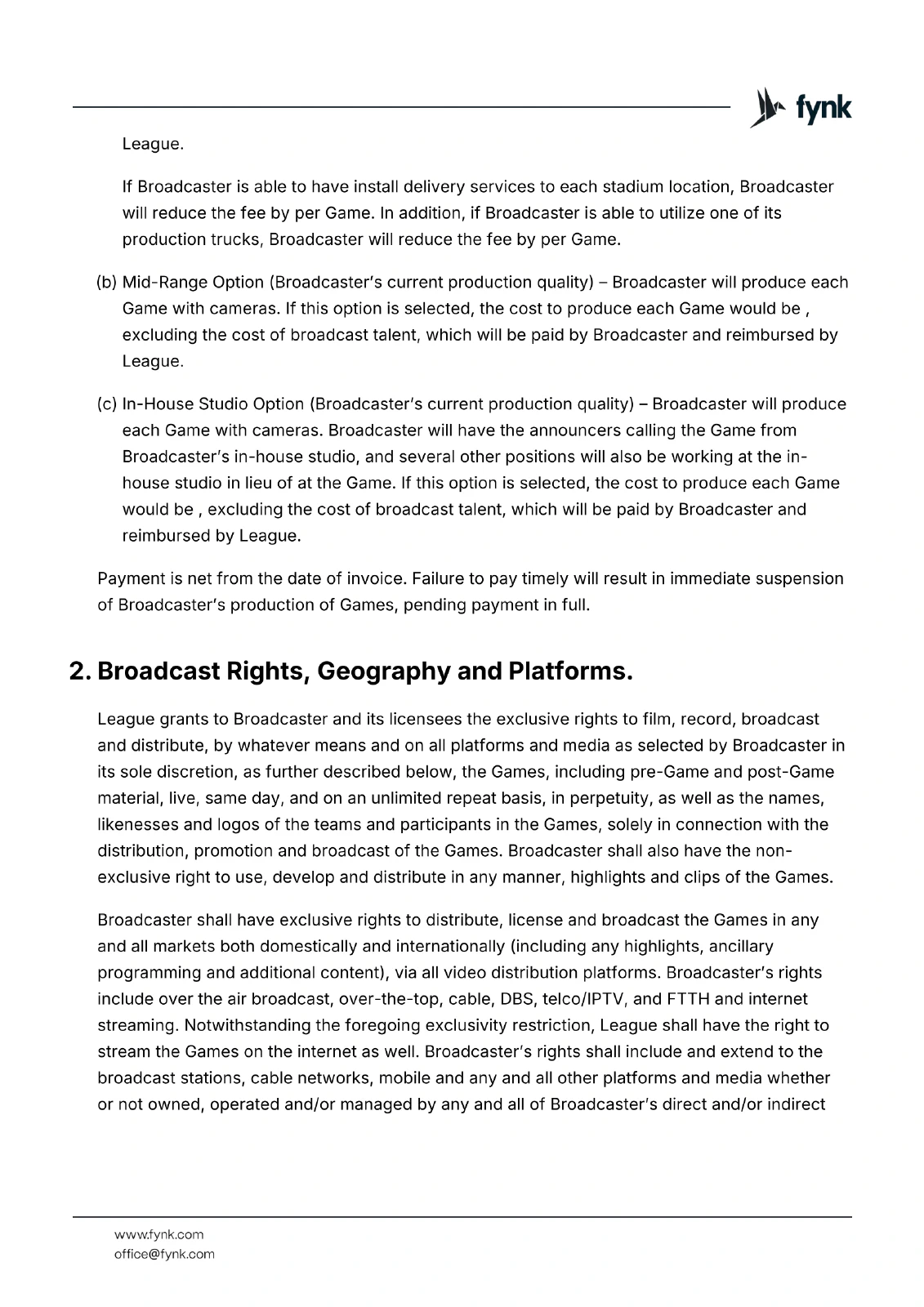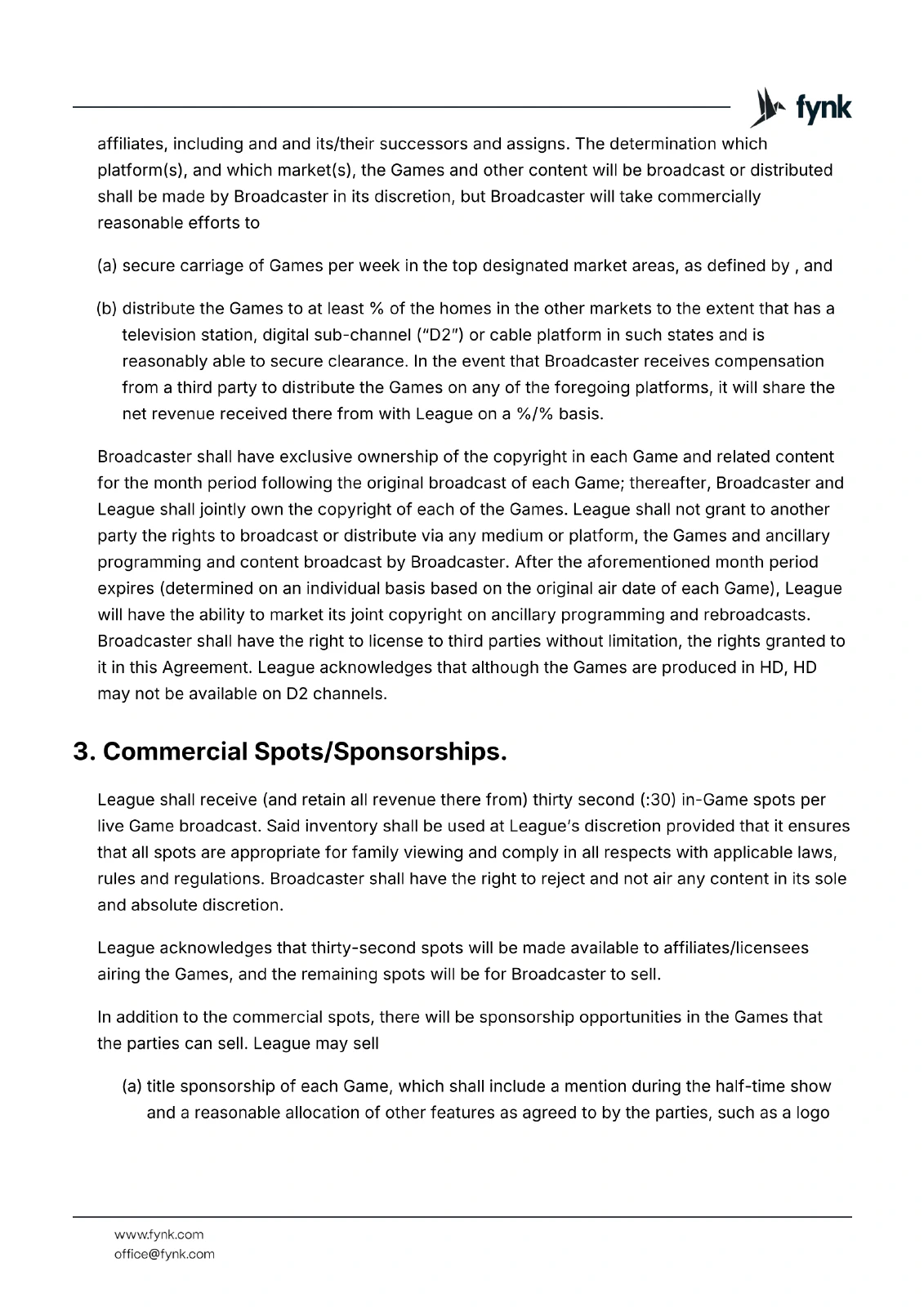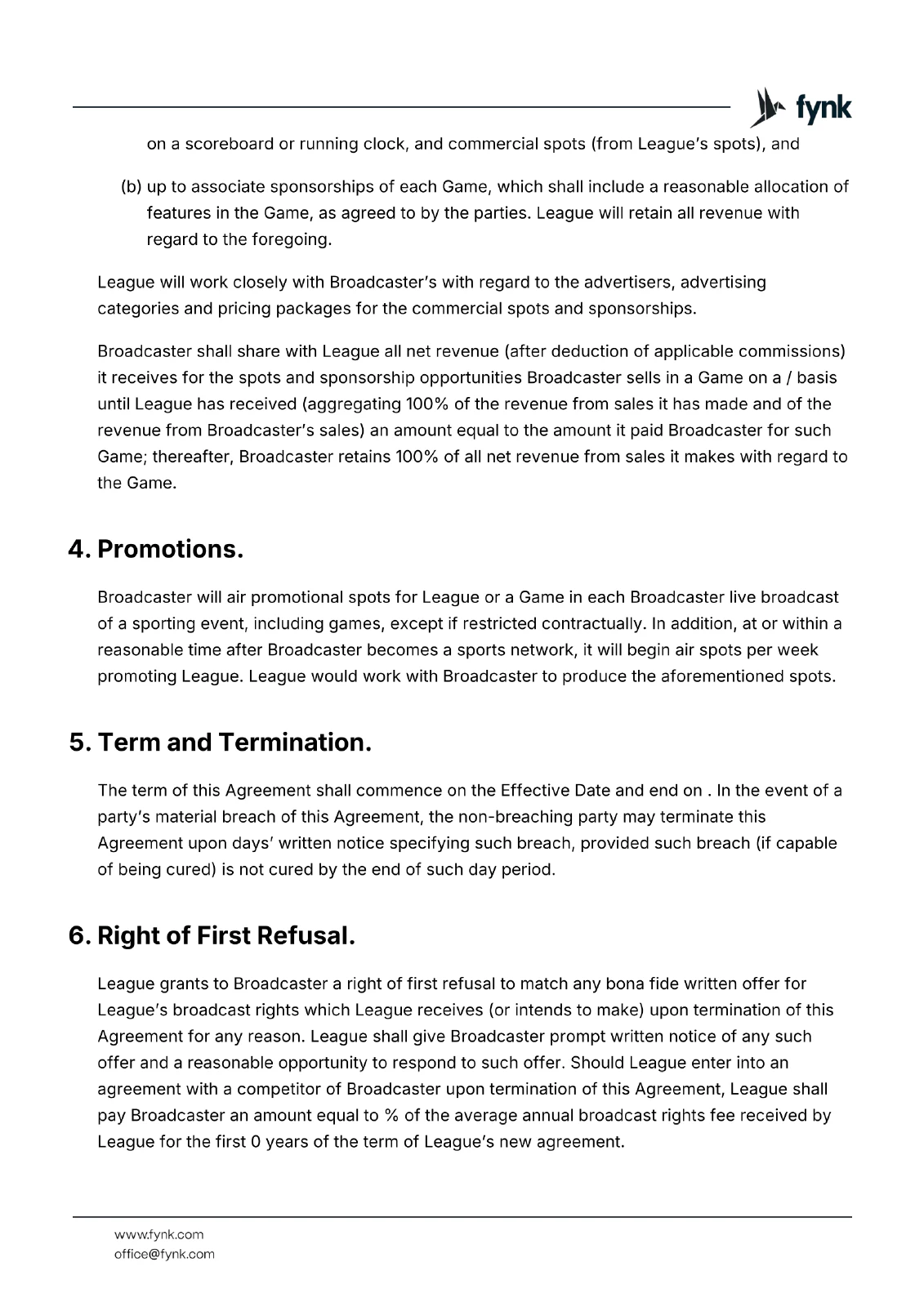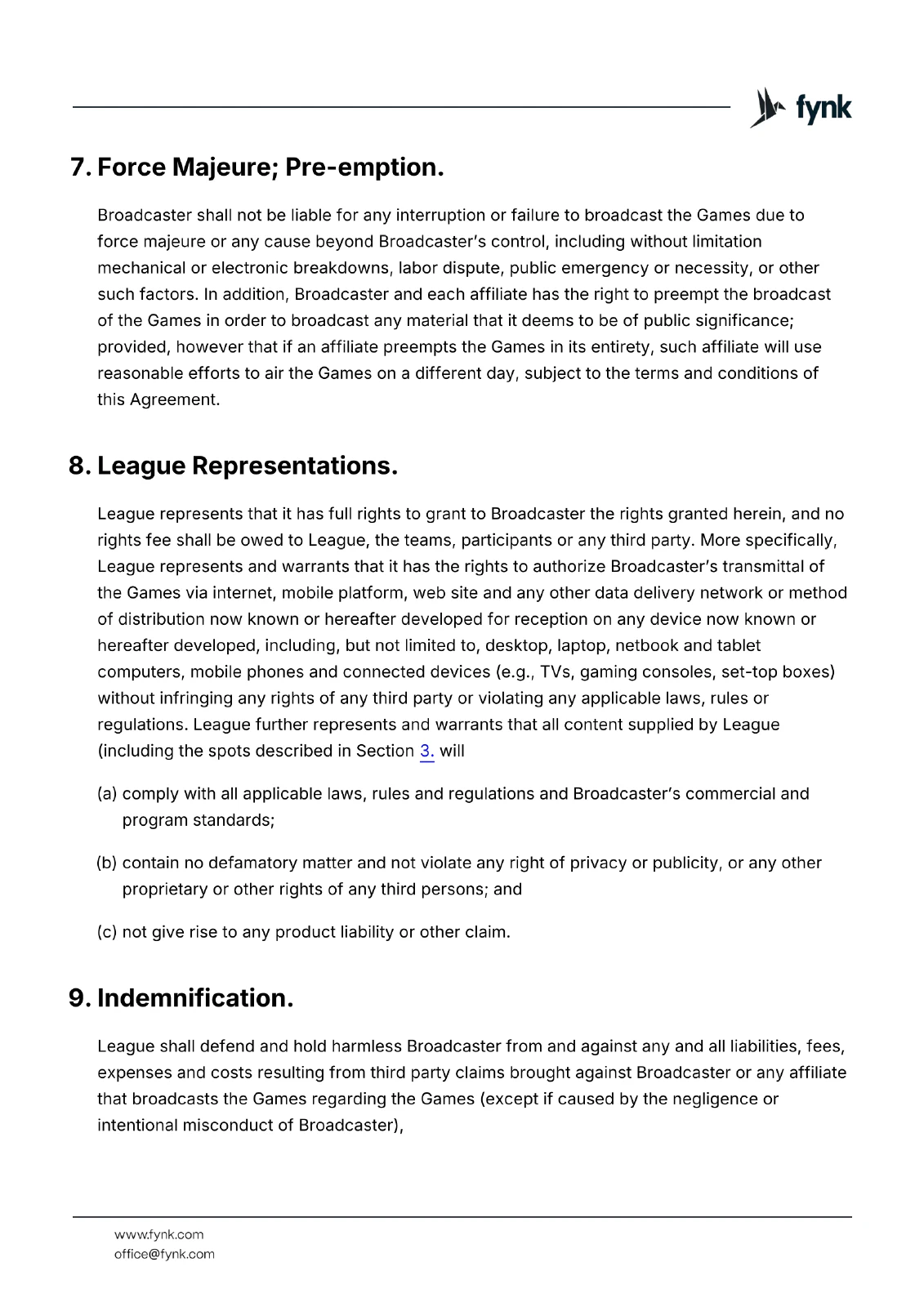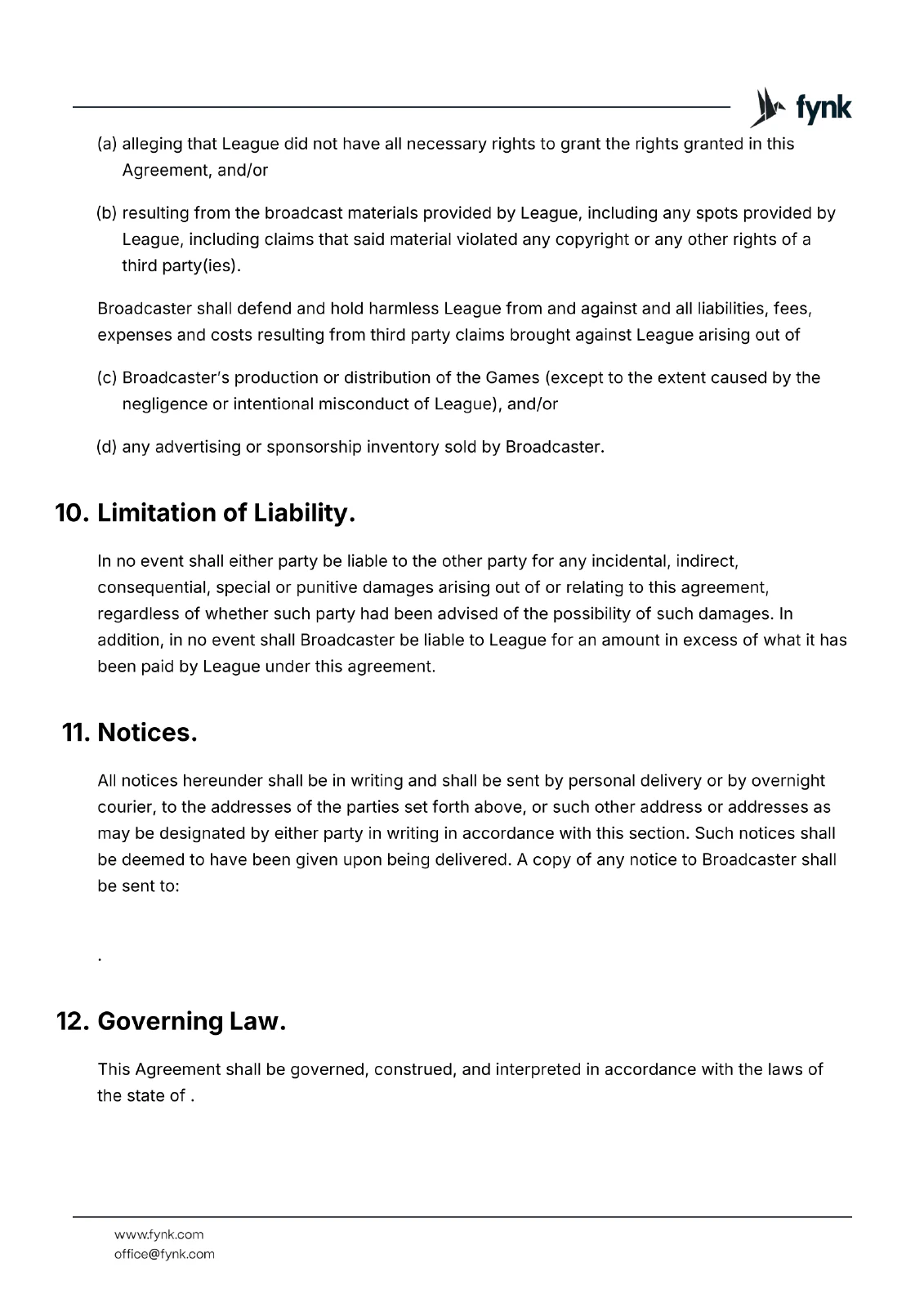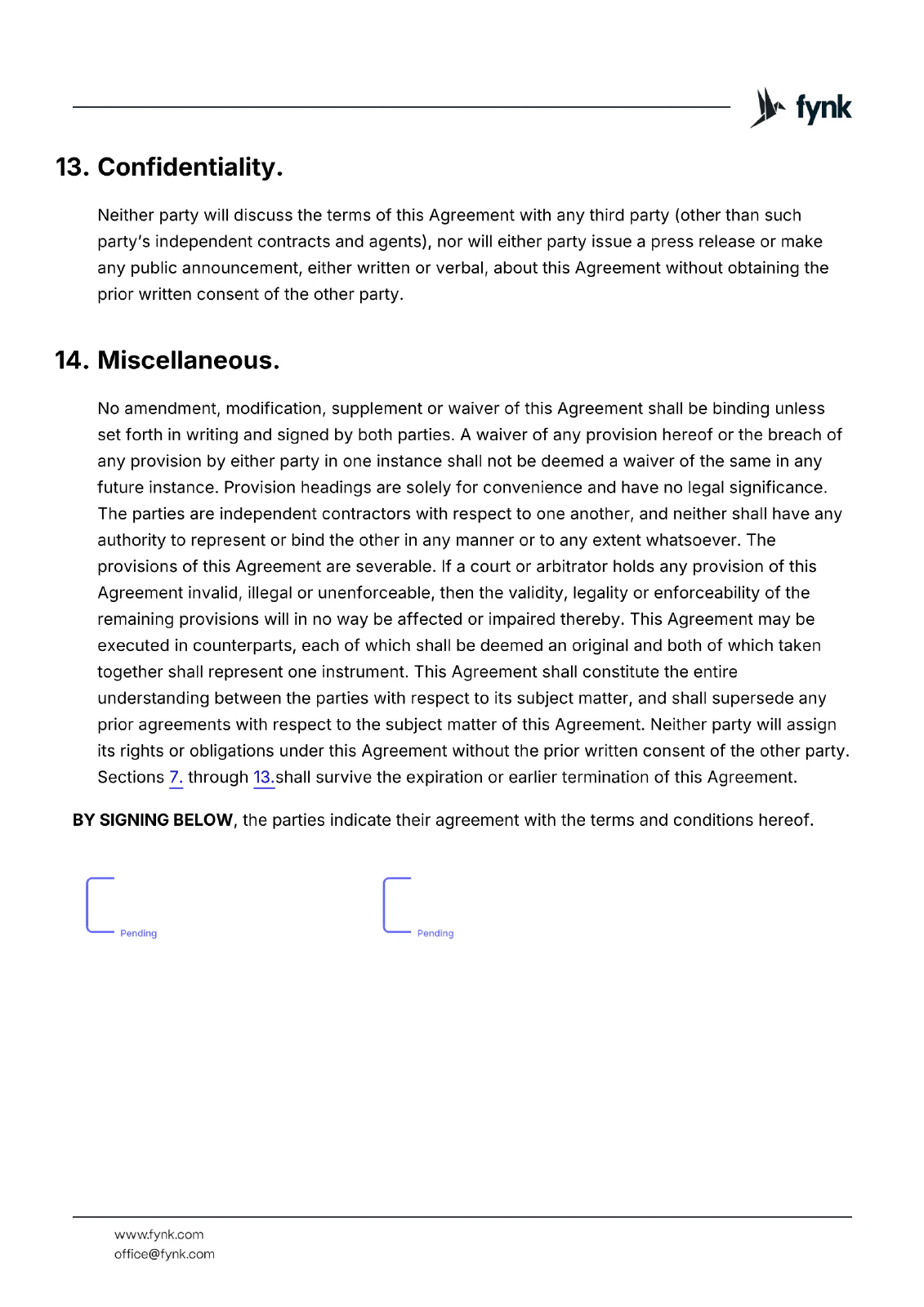Broadcast Rights Agreement
THIS BROADCAST RIGHTS AGREEMENT (“Agreement”) is entered into this but effective as of (“Effective Date”), by and between , a corporation located at (“League”), and , a limited liability company located at (“Broadcaster”).
Recitals
League is a professional spring football league whose teams will play regular season games and playoff games per season (the “Games”) beginning in ;
Broadcaster produces telecasts for various sporting events, and distributes the telecasts to various television stations in the of stations, and to other television stations and regional cable networks; and
League would like Broadcaster to produce the telecast of the Games, distribute same to television stations and certain regional cable networks, and provide certain promotion of League and the Games, and Broadcaster would like to do the foregoing.
Therefore, in consideration of the above and the mutual benefits and promises set forth in this Agreement, League and Broadcaster agree that their rights and obligations are as follows:
Broadcast Production Options and Fees.
Broadcaster shall be responsible for the broadcast production of the Games (and certain pre-season games as selected by Broadcaster in its sole and absolute discretion) and will make all production, technical and editorial decisions regarding the Games, including pre-Game, halftime and post-Game content, which will be produced in high-definition (“HD”) in accordance with one of the following production options selected by League in writing:
High-End Option (NFL-like quality) – Broadcaster will produce each Game with cameras, with one of such cameras on a moving cart which allows for close-up shots of the quarterback and sideline coaches. If this option is selected, the cost to produce each Game would be , excluding the cost of broadcast talent, which will be paid by Broadcaster and reimbursed by League.
If Broadcaster is able to have install delivery services to each stadium location, Broadcaster will reduce the fee by per Game. In addition, if Broadcaster is able to utilize one of its production trucks, Broadcaster will reduce the fee by per Game.
Mid-Range Option (Broadcaster’s current production quality) – Broadcaster will produce each Game with cameras. If this option is selected, the cost to produce each Game would be , excluding the cost of broadcast talent, which will be paid by Broadcaster and reimbursed by League.
In-House Studio Option (Broadcaster’s current production quality) – Broadcaster will produce each Game with cameras. Broadcaster will have the announcers calling the Game from Broadcaster’s in-house studio, and several other positions will also be working at the in-house studio in lieu of at the Game. If this option is selected, the cost to produce each Game would be , excluding the cost of broadcast talent, which will be paid by Broadcaster and reimbursed by League.
Payment is net from the date of invoice. Failure to pay timely will result in immediate suspension of Broadcaster’s production of Games, pending payment in full.
Broadcast Rights, Geography and Platforms.
League grants to Broadcaster and its licensees the exclusive rights to film, record, broadcast and distribute, by whatever means and on all platforms and media as selected by Broadcaster in its sole discretion, as further described below, the Games, including pre-Game and post-Game material, live, same day, and on an unlimited repeat basis, in perpetuity, as well as the names, likenesses and logos of the teams and participants in the Games, solely in connection with the distribution, promotion and broadcast of the Games. Broadcaster shall also have the non-exclusive right to use, develop and distribute in any manner, highlights and clips of the Games.
Broadcaster shall have exclusive rights to distribute, license and broadcast the Games in any and all markets both domestically and internationally (including any highlights, ancillary programming and additional content), via all video distribution platforms. Broadcaster’s rights include over the air broadcast, over-the-top, cable, DBS, telco/IPTV, and FTTH and internet streaming. Notwithstanding the foregoing exclusivity restriction, League shall have the right to stream the Games on the internet as well. Broadcaster’s rights shall include and extend to the broadcast stations, cable networks, mobile and any and all other platforms and media whether or not owned, operated and/or managed by any and all of Broadcaster’s direct and/or indirect affiliates, including and and its/their successors and assigns. The determination which platform(s), and which market(s), the Games and other content will be broadcast or distributed shall be made by Broadcaster in its discretion, but Broadcaster will take commercially reasonable efforts to
secure carriage of Games per week in the top designated market areas, as defined by , and
distribute the Games to at least % of the homes in the other markets to the extent that has a television station, digital sub-channel (“D2”) or cable platform in such states and is reasonably able to secure clearance. In the event that Broadcaster receives compensation from a third party to distribute the Games on any of the foregoing platforms, it will share the net revenue received there from with League on a %/% basis.
Broadcaster shall have exclusive ownership of the copyright in each Game and related content for the month period following the original broadcast of each Game; thereafter, Broadcaster and League shall jointly own the copyright of each of the Games. League shall not grant to another party the rights to broadcast or distribute via any medium or platform, the Games and ancillary programming and content broadcast by Broadcaster. After the aforementioned month period expires (determined on an individual basis based on the original air date of each Game), League will have the ability to market its joint copyright on ancillary programming and rebroadcasts. Broadcaster shall have the right to license to third parties without limitation, the rights granted to it in this Agreement. League acknowledges that although the Games are produced in HD, HD may not be available on D2 channels.
3. Commercial Spots/Sponsorships.
League shall receive (and retain all revenue there from) thirty second (:30) in-Game spots per live Game broadcast. Said inventory shall be used at League’s discretion provided that it ensures that all spots are appropriate for family viewing and comply in all respects with applicable laws, rules and regulations. Broadcaster shall have the right to reject and not air any content in its sole and absolute discretion.
League acknowledges that thirty-second spots will be made available to affiliates/licensees airing the Games, and the remaining spots will be for Broadcaster to sell.
In addition to the commercial spots, there will be sponsorship opportunities in the Games that the parties can sell. League may sell
title sponsorship of each Game, which shall include a mention during the half-time show and a reasonable allocation of other features as agreed to by the parties, such as a logo on a scoreboard or running clock, and commercial spots (from League’s spots), and
up to associate sponsorships of each Game, which shall include a reasonable allocation of features in the Game, as agreed to by the parties. League will retain all revenue with regard to the foregoing.
League will work closely with Broadcaster’s with regard to the advertisers, advertising categories and pricing packages for the commercial spots and sponsorships.
Broadcaster shall share with League all net revenue (after deduction of applicable commissions) it receives for the spots and sponsorship opportunities Broadcaster sells in a Game on a / basis until League has received (aggregating 100% of the revenue from sales it has made and of the revenue from Broadcaster’s sales) an amount equal to the amount it paid Broadcaster for such Game; thereafter, Broadcaster retains 100% of all net revenue from sales it makes with regard to the Game.
Promotions.
Broadcaster will air promotional spots for League or a Game in each Broadcaster live broadcast of a sporting event, including games, except if restricted contractually. In addition, at or within a reasonable time after Broadcaster becomes a sports network, it will begin air spots per week promoting League. League would work with Broadcaster to produce the aforementioned spots.
Term and Termination.
The term of this Agreement shall commence on the Effective Date and end on . In the event of a party’s material breach of this Agreement, the non-breaching party may terminate this Agreement upon days’ written notice specifying such breach, provided such breach (if capable of being cured) is not cured by the end of such day period.
Right of First Refusal.
League grants to Broadcaster a right of first refusal to match any bona fide written offer for League’s broadcast rights which League receives (or intends to make) upon termination of this Agreement for any reason. League shall give Broadcaster prompt written notice of any such offer and a reasonable opportunity to respond to such offer. Should League enter into an agreement with a competitor of Broadcaster upon termination of this Agreement, League shall pay Broadcaster an amount equal to % of the average annual broadcast rights fee received by League for the first 0 years of the term of League’s new agreement.
Force Majeure; Pre-emption.
Broadcaster shall not be liable for any interruption or failure to broadcast the Games due to force majeure or any cause beyond Broadcaster’s control, including without limitation mechanical or electronic breakdowns, labor dispute, public emergency or necessity, or other such factors. In addition, Broadcaster and each affiliate has the right to preempt the broadcast of the Games in order to broadcast any material that it deems to be of public significance; provided, however that if an affiliate preempts the Games in its entirety, such affiliate will use reasonable efforts to air the Games on a different day, subject to the terms and conditions of this Agreement.
League Representations.
League represents that it has full rights to grant to Broadcaster the rights granted herein, and no rights fee shall be owed to League, the teams, participants or any third party. More specifically, League represents and warrants that it has the rights to authorize Broadcaster’s transmittal of the Games via internet, mobile platform, web site and any other data delivery network or method of distribution now known or hereafter developed for reception on any device now known or hereafter developed, including, but not limited to, desktop, laptop, netbook and tablet computers, mobile phones and connected devices (e.g., TVs, gaming consoles, set-top boxes) without infringing any rights of any third party or violating any applicable laws, rules or regulations. League further represents and warrants that all content supplied by League (including the spots described in Section 3. will
comply with all applicable laws, rules and regulations and Broadcaster’s commercial and program standards;
contain no defamatory matter and not violate any right of privacy or publicity, or any other proprietary or other rights of any third persons; and
not give rise to any product liability or other claim.
Indemnification.
League shall defend and hold harmless Broadcaster from and against any and all liabilities, fees, expenses and costs resulting from third party claims brought against Broadcaster or any affiliate that broadcasts the Games regarding the Games (except if caused by the negligence or intentional misconduct of Broadcaster),
alleging that League did not have all necessary rights to grant the rights granted in this Agreement, and/or
resulting from the broadcast materials provided by League, including any spots provided by League, including claims that said material violated any copyright or any other rights of a third party(ies).
Broadcaster shall defend and hold harmless League from and against and all liabilities, fees, expenses and costs resulting from third party claims brought against League arising out of
Broadcaster’s production or distribution of the Games (except to the extent caused by the negligence or intentional misconduct of League), and/or
any advertising or sponsorship inventory sold by Broadcaster.
Limitation of Liability.
In no event shall either party be liable to the other party for any incidental, indirect, consequential, special or punitive damages arising out of or relating to this agreement, regardless of whether such party had been advised of the possibility of such damages. In addition, in no event shall Broadcaster be liable to League for an amount in excess of what it has been paid by League under this agreement.
Notices.
All notices hereunder shall be in writing and shall be sent by personal delivery or by overnight courier, to the addresses of the parties set forth above, or such other address or addresses as may be designated by either party in writing in accordance with this section. Such notices shall be deemed to have been given upon being delivered. A copy of any notice to Broadcaster shall be sent to:
.
Governing Law.
This Agreement shall be governed, construed, and interpreted in accordance with the laws of the state of .
Confidentiality.
Neither party will discuss the terms of this Agreement with any third party (other than such party’s independent contracts and agents), nor will either party issue a press release or make any public announcement, either written or verbal, about this Agreement without obtaining the prior written consent of the other party.
Miscellaneous.
No amendment, modification, supplement or waiver of this Agreement shall be binding unless set forth in writing and signed by both parties. A waiver of any provision hereof or the breach of any provision by either party in one instance shall not be deemed a waiver of the same in any future instance. Provision headings are solely for convenience and have no legal significance. The parties are independent contractors with respect to one another, and neither shall have any authority to represent or bind the other in any manner or to any extent whatsoever. The provisions of this Agreement are severable. If a court or arbitrator holds any provision of this Agreement invalid, illegal or unenforceable, then the validity, legality or enforceability of the remaining provisions will in no way be affected or impaired thereby. This Agreement may be executed in counterparts, each of which shall be deemed an original and both of which taken together shall represent one instrument. This Agreement shall constitute the entire understanding between the parties with respect to its subject matter, and shall supersede any prior agreements with respect to the subject matter of this Agreement. Neither party will assign its rights or obligations under this Agreement without the prior written consent of the other party. Sections 7. through 13.shall survive the expiration or earlier termination of this Agreement.
BY SIGNING BELOW, the parties indicate their agreement with the terms and conditions hereof.

